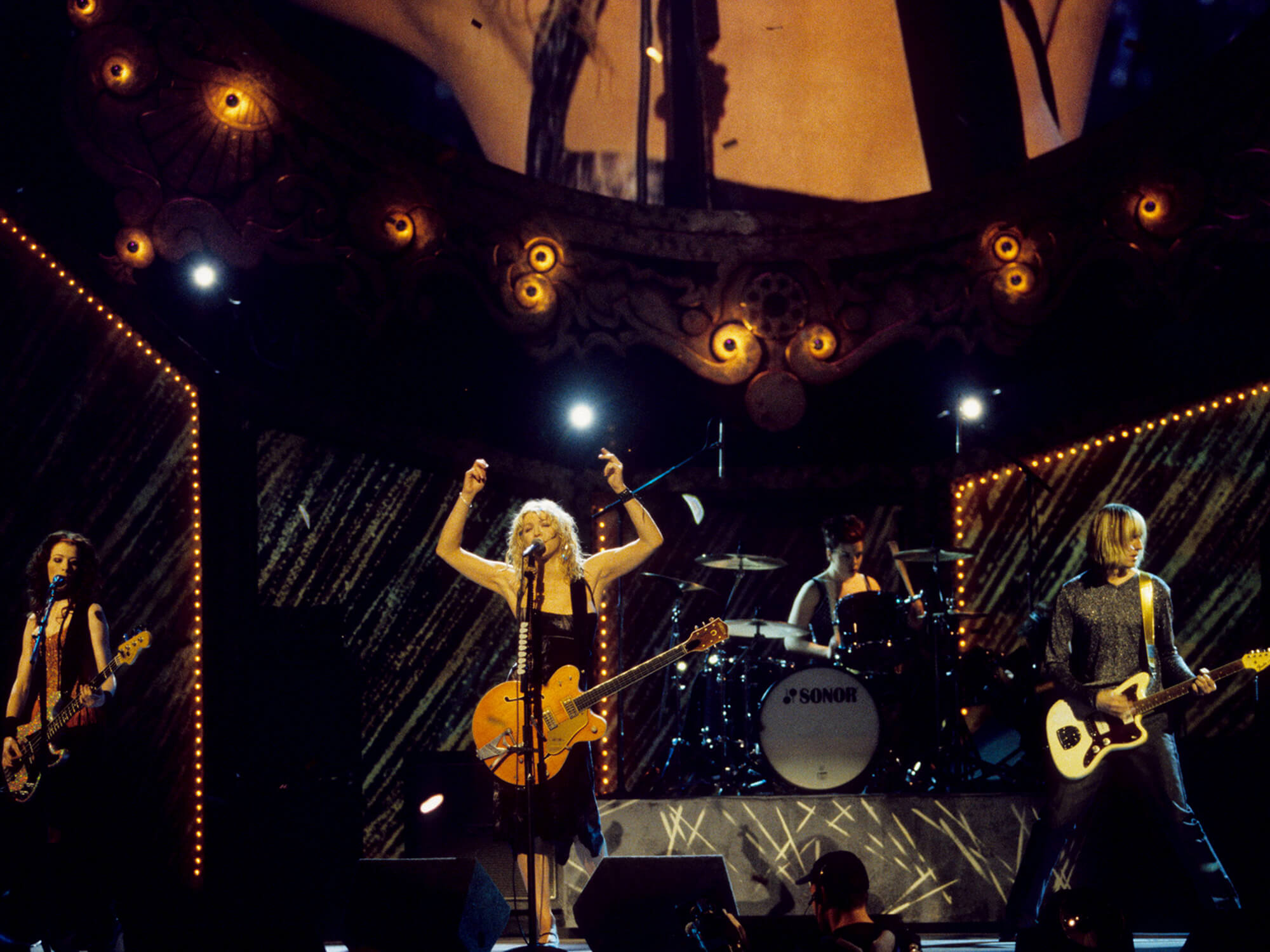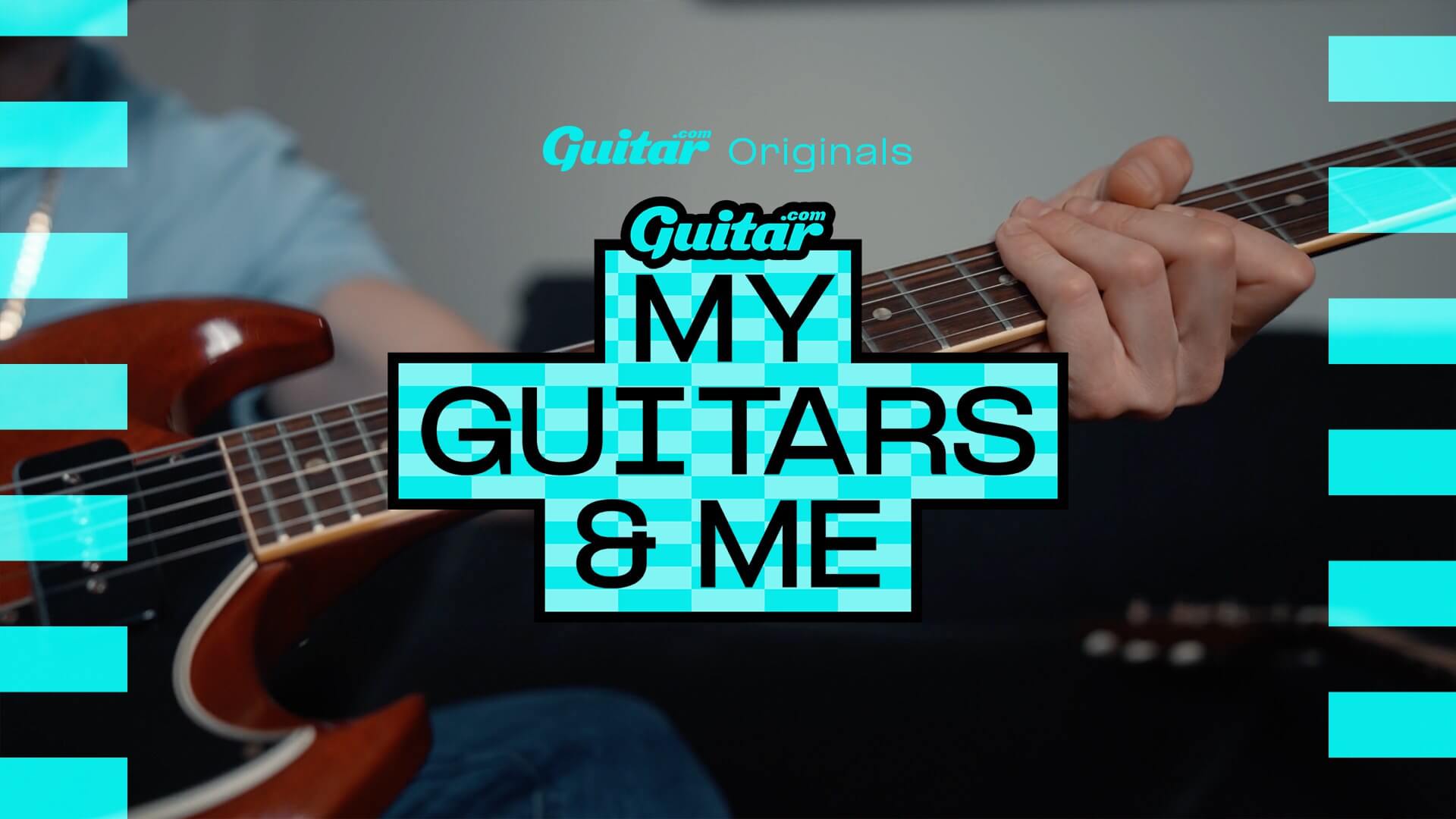Five essential Hole tracks that guitarists need to hear
Courtney Love has spent her entire career on a mission, and despite the inevitable spectre of her husband’s band in the picture, she carved out her own unique guitar niche…

Courtney Love performing with Hole at The 1998 Billboard Music Awards. Image: Ke.Mazur/WireImage via Getty Images
Courtney Love knew back at the start. Very few bands are sparked by a mission statement (or, more accurately, an advert) as clear as the one she apparently used to bring Hole into the world: “I want to start a band. My influences are Big Black, Sonic Youth, and Fleetwood Mac.”
It’s remarkable how well Hole covered those bases during their short imperial phase, when Love and Eric Erlandson – alongside a rotating rhythm section perhaps best defined by drummer Patty Schemel in tandem with bassists Kristen Pfaff or Melissa Auf der Maur – dredged some truly gnarly, confrontational pop songs from deep within.
Hole’s music was gritty, emotionally heavy and contextually complex, with the profile of Love’s husband Kurt Cobain looming over their best work and the non-stop hum of industry misogyny undercutting records that should have been lionised from the word go. Here, we take a look at five songs that provide a window into a discography that stands as one of the most vital of the 1990s.
Start Here: Violet (Live Through This, 1994)
Hole’s second LP was released only days after Cobain’s death, inextricably linking it to an epoch-defining tragedy, warping its title into an ill-fitting shape, and tamping down Love’s seething, multifaceted writing into something that could be controlled from the outside. “I put a lot of energy into the music because it was the place I could put my energy,” Love once told Spin’s Jessica Hopper. “And the title of the record is not a prediction of the future. It’s, like, fucking live through what I already lived through, you motherfuckers!”
Shut off that noise, though, and you’ll find a record about precision and acceleration – witness the way the guitars so often put the hammer down, with the rhythm section falling in behind them and Love’s vocals putting it out of sight. That feeling is there on Jennifer’s Body, Plump and Asking For It, but it’s most important right out of the gate with Violet, a song reportedly about Love’s ex Billy Corgan that had been kicking around for a few years by the time it was tracked with producers Paul Q. Kolderie and Sean Slade at Triclops in Marietta, Georgia. An opener for the ages.
Then go here: Teenage Whore (Pretty on the Inside, 1991)
Pretty on the Inside is a filthy, needling rock record that can’t always hide the hooks waiting to burst from its skin. The first song – a hit on the UK indie charts after its release as a single – is a doomy, scabrous dirge driven by toxic mother-daughter mudslinging, with Love and Erlandson’s chords eventually retreating into a chorus that might have been lush in someone else’s hands, but is instead grimy, intimate and weird.
Produced by Sonic Youth’s Kim Gordon and Don Fleming at Music Box Studios in Hollywood, and featuring Jill Emery on bass and Caroline Rue on drums, Pretty on the Inside remains an uncompromising thing more than three decades later. It’s all knotted noise and transgressive riffs on rock history (Star Belly interpolates Neil Young’s Cinnamon Girl, Fleetwood Mac’s Rhiannon and Love’s former band Pagan Babies into a sound collage) but it’s also very obviously the place where things began to cohere.
Stop off here: Turpentine (1990, released on The First Session EP, 1997)
Generally held to be the first Hole song, Turpentine might be the work of a band figuring themselves out, but it still packs a punch. Recorded at a tiny Los Angeles studio in 1990 (and eventually released years later) it is both familiar and unfamiliar all at once. Its proto-metal riffs and rumbling chorus are an odd mesh – almost evoking a more rough and ready Gish-era Smashing Pumpkins – but Love’s lyrics, vocals and persona are all there. “I know all you devils by your Christian names and I know all you bitches by your Christian names,” she roars, incandescent.
Almost home: Boys on the Radio (Celebrity Skin, 1998)
Celebrity Skin is where the Fleetwood Mac bit gets dialled up. The title track is a melodic barrage that’s also home to one of the great riffs of the 90s. The Corgan co-write Malibu is as sweet and surprising a pop song as you could dream of (Love says it was penned for Stevie Nicks, so…) But it’s Boys on the Radio that perhaps best combines Hole’s ragged, gutsy soul with gilt-edged hook construction.
There is a moment midway through the chorus where the doomed romantics of Love’s lyrics are swamped by a crashing wave of distortion. It’s genuinely euphoric. It also sounds like a million bucks – clean in a way that set up a million accusations of selling out at a time when things like that really stung. Truly, if that’s what you’re thinking while this is rattling from the speakers, then you’re lost.
Nightcap: Doll Parts (Live Through This, 1994)
“Someday, you will ache like I ache”. That’s it, isn’t it? That’s what all these pop songs have been trying to tell us all this time. Written in 1991 or so, as Love was getting together with Cobain, Doll Parts was her attempt to pull all of the insecurity, hurt, desire and uncertainty of new love into a legible whole.
As she later put it: “It was about a boy, whose band had just left town, who I’d been sleeping with, who I heard was sleeping with two other girls, it was my way of saying ‘You’re a fucking idiot if you don’t choose ME, and here is all the desire and fury and love that I feel for you.’” That sense of unravelling is here, too, as the guitars thrash through the early sense of poise, Love’s voice pugilistic as Schemel and Erlandson up the ante. If there’s one song that defines Hole, captures it all in one spot, it’s probably this one.

Where next?
There was another Hole record (Nobody’s Daughter) released in 2010. It’s really more of a Love solo thing, with a new line-up. “That’s what Hole is: that sound of Eric’s guitar and Courtney’s vocals. Hole isn’t Hole without those two together,” Schemel told Hopper, and it’s hard to disagree. It’s fine, as are bits of Love’s America’s Sweetheart album, particularly the enjoyably sleazy/dumb single Mono. Melissa Auf der Maur played with Smashing Pumpkins and as a solo artist, while Hit So Hard, a documentary about Schemel’s descent into drugs and homelessness and subsequent recovery, is a depiction of things unsaid in the wake of loss and unimaginable pressure, speculation and scrutiny.



